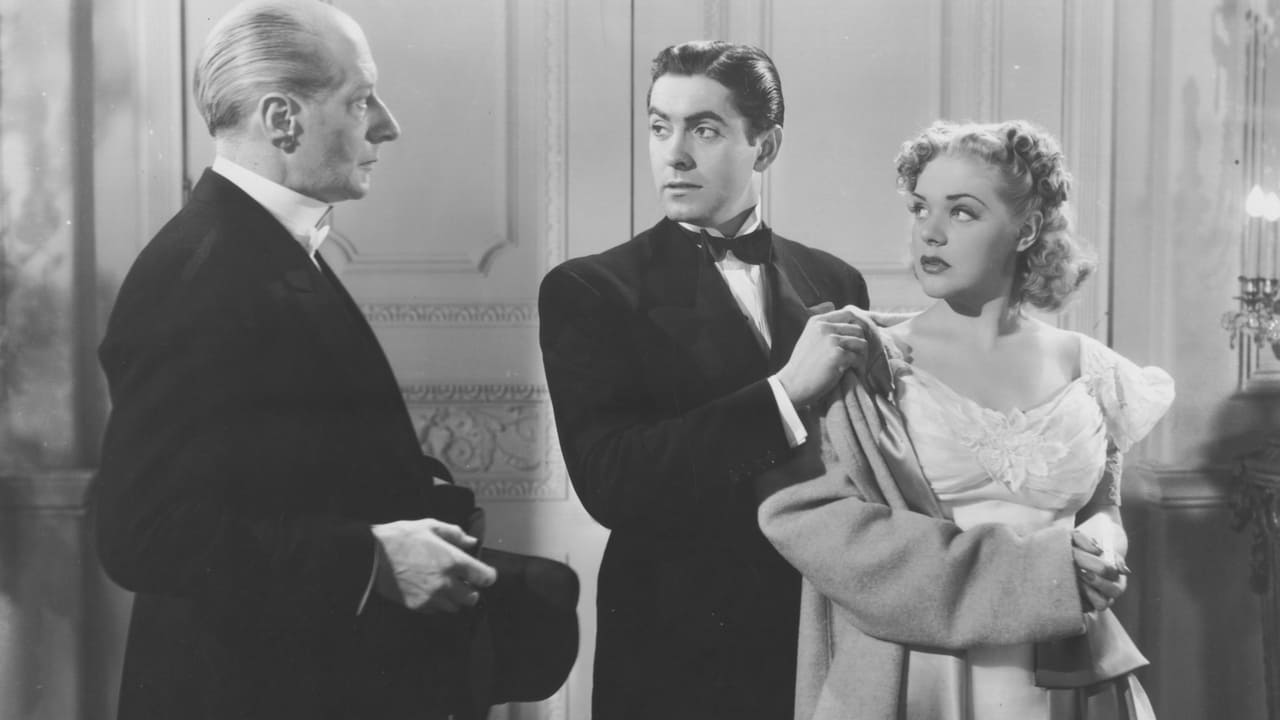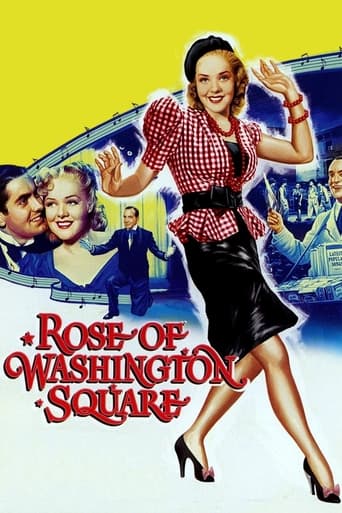

I gave it a 7.5 out of 10
... View MoreA waste of 90 minutes of my life
... View MoreYour blood may run cold, but you now find yourself pinioned to the story.
... View MoreA terrific literary drama and character piece that shows how the process of creating art can be seen differently by those doing it and those looking at it from the outside.
... View MoreCopyright 12 May 1939 by 20th Century-Fox Film Corp. New York opening at the Roxy: 5 May 1939. U.S. release: 5 May 1939. U.K. release: July 1939. Australian release: 10 August 1939. 7,766 feet. 86 minutes. (Available on an excellent Fox DVD).SYNOPSIS: Singer falls for a no-good gambler. NOTES: Originally Faye sang "I'll See You In My Dreams" in a New York supper club sequence. Other deleted songs were "Avalon" and "I'm Always Chasing Rainbows". Fanny Brice sued the studio for damages. The matter was settled out of court. Remade in 1968 as Funny Girl.VIEWER'S GUIDE: Difficult. Based on the career of Fanny Brice (and also partly on that of Al Jolson himself), so I would say suitable for all.COMMENT: If Love Me Tonight is one of my favorite musical comedies, Rose of Washington Square is certainly one of my top choices for musical drama. Not that there is no comedy in this movie. Far from it. In fact Hobart Cavanaugh contributes the portrayal of his career as the unwitting if ultimately very willing stooge. And Jolson plays the scenes with Cavanaugh with such panache, it's hard to realize his screen career was virtually over. Of course he also has some of his trademark songs and these he puts over with such style, Jolie is worth the price of admission alone. But despite his huge contribution to the movie's overall appeal, Jolson is only the support. It's Alice Faye's movie. And what a great performance she gives! And boy, does she knock over those songs! Power is magnetic too, giving a far more accurate and far more arresting interpretation of Nicky Arnstein than the bland and disappointingly colorless Omar Sharif. Power is a confidence man with persuasively shallow charm. Ideally cast. This and Nightmare Alley are Power at his absolute best.Every other player in Rose is as forcefully cast from William Frawley's fix-it agent through Ben Welden's sarcastically menacing Toby and Charles Wilson's nemesis of a flatfoot to Harry Hayden's frightened victim ("I've got a gun!"). Armed with Nunnally Johnson's scintillating dialogue and taking every advantage of their dramatic opportunities, many of these character people likewise hand out some of the most memorable cameos of their lives. Welden, for example, must have been cast in hundreds of movies, but this is his finest hour ("I've got to hand it to you, Clinton...")Johnson's script is a model of fine screen writing. Not only has he told the Fanny Brice-Nicky Arnstein story in a powerfully fast-paced 86 minutes (Funny Girl took a ponderous 155 to cover the same ground), but he has fleshed it out with an extraordinarily large gallery of fascinating subsidiary characters as well (aside from the swamped Streisand and soggy Sharif, I don't remember any other people in Funny Girl at all). And in addition to these miracles of arresting narrative construction, Johnson has still allowed plenty of time for some terrific standards from both Jolson and Faye, both of whom are in tip-top voice.Director Gregory Ratoff has risen nobly to the occasion. I've remarked before in Hollywood Classics that Ratoff's directorial abilities seemed to swing violently yet unaccountably from the extremely banal to the inventively brilliant from one film to another. Fortunately, Rose finds him at his most stylishly accomplished. Not only has he drawn winning performances from his players, but he reinforces the drama and comedy in Johnson's script by inspired camera placements and deft cutting. Or maybe it's ace cinematographer Karl Freund's inspired camera placements and Louis Leoffler's smooth, forceful cutting. In any case, Freund's masterful lighting of course is a major asset. And I loved the sets and costumes. Production values are lavish — and there's that wonderful 20th Century-Fox sound!
... View MoreEntertainment careers, romance, and petty crime mix together to create a reasonably good film, based on the real life story of Ziegfeld star Fanny Brice and her attraction to gambler Nicky Arnstein. The script changes the names, and the two leads become Rose (Alice Faye) and Bart (Tyrone Power). "Rose Of Washington Square" is a thin story connected by numerous musical numbers.The film has the look and feel of a long-ago era, specifically Vaudeville, with its eclectic mix of self-contained acts: singing, dancing, magic, and comedy. One lengthy segment features Rose singing in Washington Square, but interrupted by an unrelated act called "Igor and Tanya", an acrobatic performance not connected to anything else in the film. And then there's the stage performance wherein Rose and various dancers perform a dance that includes a magic act. As the dancing proceeds, each person brings forth a lit cigarette out of thin air, smokes it, then fetches another cigarette from out of nowhere.This tribute to Vaudeville goes into overdrive with the appearance of entertainer Al Jolson, as character Ted Cotter. This character has little or nothing to do with Fanny Brice. I think the reason he's in the script is that he represents Brice's historical era. Jolson's inclusion ignites the plot, generating real pizazz into an otherwise lazy, dreary story. All bug-eyed and in black-face, and wearing white gloves, Jolson electrifies at the plush Winter Garden Theater, with his standard songs: "Rock-A-Bye Your Baby", "My Mammy", and "California, Here I Come".Casting is mixed. Tyrone Power is surprisingly good. And I enjoyed William Frawley as a talent agent. But glamorous Alice Faye is not convincing as a stand-in for Brice. Faye does sing quite well, but I didn't care for any of her songs, with the exception of "My Man", Brice's signature number.Costumes, hairdos, and prod design all seem to reflect well the early twentieth century era. B&W cinematography, sound effects, and editing are all competent, and pleasantly unobtrusive.Without Jolson, the film would be average at best. But Jolson alone ups the entertainment value several notches, and that Vaudeville atmosphere is wonderfully nostalgic.
... View MoreThis is an excellent movie musical from the 20th Fox studio, which made excellent movie musicals. Fox made all those great musicals with John Payne and Alice Faye, until she got supplanted by Betty Grable. It's all here - storyline, music, production values and a Who's-Who cast of memorable character actors from the Golden Age of Hollywood."Rose" is actually a revue with only one or two songs written for the movie; "I Never Knew Heaven Could Speak" is one and is the best song in the picture. The rest are songs from pre and post WW1 and are old standards - there are 20 songs in all. Then there is the Cigarette Dance which contains some trick photography and is very clever indeed.It stars Tyrone Power and Alice Faye who handle acting chores, but the singing duties belong to Al Jolson, who at one time was considered the best entertainer of the 20th century on either coast. He comes alive when he sings his signature numbers but has a very limited acting range. This picture is seldom seen today because, for reasons rooted in the early part of the last century, Jolson sang in blackface. Apparently this worked for him but the film is no longer in the good graces of the PC crowd and those intimidated by them. The plot is based (loosely) on Fanny Brice and her husband/problem child Nicky Arnstein. As we know too well, Hollywood feels fiction is stranger than truth and punches up many stories that were good to begin with. Plus, they were true, and what fun is that.Do yourself a favor; if you can find this picture watch it and see how Hollywood used to do it in the good old days. As I stated in the summary, that's entertainment in the purest sense of the term. I gave it a well-deserved rating of 8.
... View MoreThis 20th Century release was a vehicle for Alice Faye, one of the most popular actresses in Hollywood musicals, plays Rose Sargent. Ironically, this is no musical per se, it is a melodrama with music inserted in the narrative. The story takes us to the vaudeville days in which Rose, a beautiful woman is trying to make it in show biz. Ted Cotter, also a singer, admires Rose in a platonic way. Even after he makes it big, Ted will always try to get her an opportunity in which to shine. Rose, unfortunately, falls in love with Barton Clinton, a man that will prove he is not worthy of her. Barton, a con man, has good connections with people of higher living. Their love affair is doomed from the start. Barton keeps falling lower and lower, but Rose, who loves him, sticks by him no matter what.The story is in reality a disguised take on the real life of Fanny Brice and her husband Nick Arnstein. Ms. Brice saw with horror what the studio had done to her, exposing her intimate life to a great audience and sued for damages. The case settled out of court, but it was a well known fact people guessed who the real Rose was.Gregory Ratoff directed the film. It was obviously a vehicle for both Alice Faye and Al Jolson, who sings most of the songs the public associated him with. Alice Faye and Tyrone Power, who played Barton, made an engaging couple in the films they were featured and it's easy to see why. Both actors were at the prime of their careers. Others in the cast include William Frawley, Joyce Compton. Veteran actor Horace McMahon appears briefly, as well as Louis Prima.This film is entertaining and light. It will not disappoint viewers.
... View More